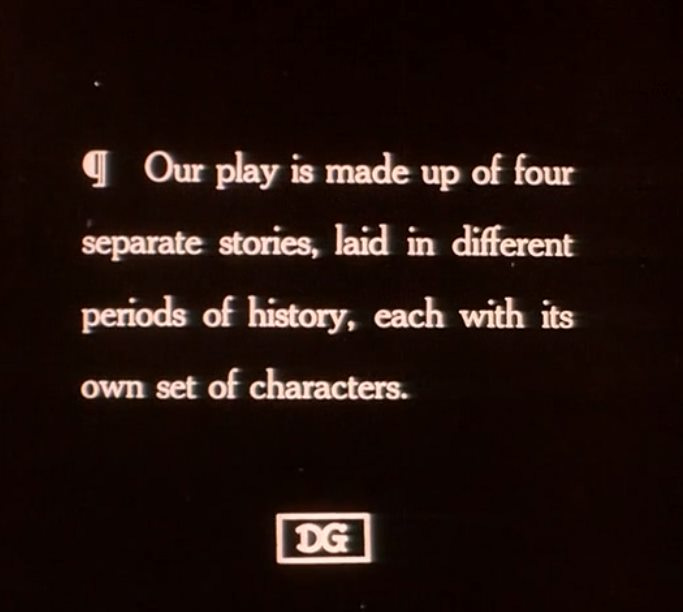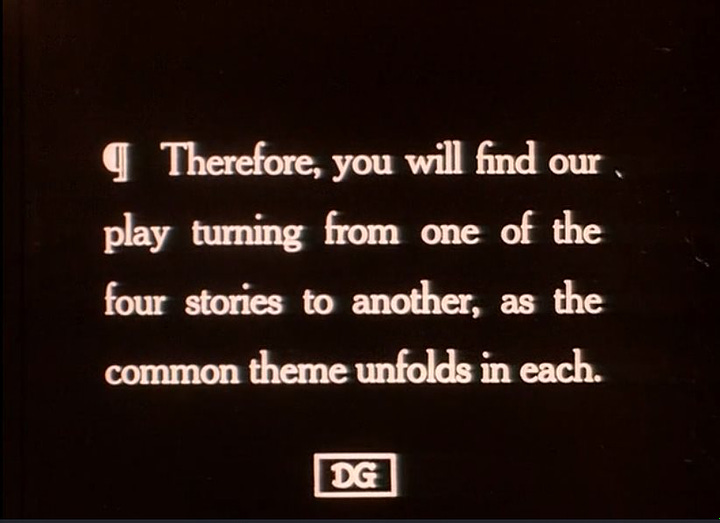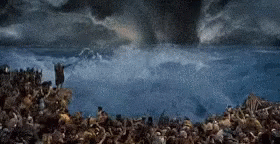If you don’t recognize the thumbnail of today’s article, it’s from DW Griffith’s silent epic Intolerance.1 He made it as a kind of response to the reaction to his earlier film Birth of a Nation, which was regarded, even in 1915, as extremely racist.
It’s a great film, meant to be a condemnation of intolerance—
The intolerance Griffith was concerned about, unfortunately, was not racial intolerance but intolerance towards his own racist views. The movie itself is still good, if you’re not aware of the director’s motivation. So, sorry for ruining it for you.
It just goes to show that sometimes, even a genius (and Griffith was a genius) can miss important lessons that comes at us in life.
So let’s pray we won’t be like that today…
Reading 1
Ex 1:8-14, 22
A new king, who knew nothing of Joseph, came to power in Egypt. He said to his subjects, "Look how numerous and powerful the people of the children of Israel are growing, more so than we ourselves! Come, let us deal shrewdly with them to stop their increase; otherwise, in time of war they too may join our enemies to fight against us, and so leave our country."
Accordingly, taskmasters were set over the children of Israel to oppress them with forced labor. Thus they had to build for Pharaoh the supply cities of Pithom and Raamses. Yet the more they were oppressed, the more they multiplied and spread. The Egyptians, then, dreaded the children of Israel and reduced them to cruel slavery, making life bitter for them with hard work in mortar and brick and all kinds of field work—the whole cruel fate of slaves.
Pharaoh then commanded all his subjects, "Throw into the river every boy that is born to the Hebrews, but you may let all the girls live."
Joseph saved Egypt from a great famine, and then rescued his family by bringing them into his adopted nation.
300 years later, Pharoah enslaves the Israelites and orders the murder of every boy.
It’s interesting to note that their oppression is due to their hard work in fields of manual labor, while in more recent2 history, Thomas Sowell points out antisemitism usually has roots in Jewish financial and business success.3
Either way, it shouldn’t be surprising. One lesson the Bible teaches over and over is that if you do the right thing, the world will hate you.
Responsorial Psalm
Ps 124:1b-3, 4-6, 7-8
R. Our help is in the name of the Lord.
Had not the LORD been with us–
let Israel say, had not the LORD been with us–
When men rose up against us,
then would they have swallowed us alive,
When their fury was inflamed against us.
R. Our help is in the name of the Lord.
Then would the waters have overwhelmed us;
The torrent would have swept over us;
over us then would have swept
the raging waters.
Blessed be the LORD, who did not leave us
a prey to their teeth.
R. Our help is in the name of the Lord.
We were rescued like a bird
from the fowlers' snare;
Broken was the snare,
and we were freed.
Our help is in the name of the LORD,
who made heaven and earth.
R. Our help is in the name of the Lord.
Spoiler alert: the Israelites get out of Egypt.
The Jewish people owe their continued existence to God, even back then, and so they rightfully praise him.
Alleluia
Mt 5:10
R. Alleluia, alleluia.
Blessed are they who are persecuted for the sake of righteousness,
for theirs is the Kingdom of heaven.
R. Alleluia, alleluia.
Being a Christian isn’t easy; don’t say you weren’t warned.
Gospel
Mt 10:34—11:1
Jesus said to his Apostles: "Do not think that I have come to bring peace upon the earth. I have come to bring not peace but the sword. For I have come to set a man against his father, a daughter against her mother, and a daughter-in-law against her mother-in-law; and one's enemies will be those of his household.
"Whoever loves father or mother more than me is not worthy of me, and whoever loves son or daughter more than me is not worthy of me; and whoever does not take up his cross and follow after me is not worthy of me. Whoever finds his life will lose it, and whoever loses his life for my sake will find it.
"Whoever receives you receives me, and whoever receives me receives the one who sent me. Whoever receives a prophet because he is a prophet will receive a prophet's reward, and whoever receives a righteous man because he is righteous will receive a righteous man's reward. And whoever gives only a cup of cold water to one of these little ones to drink because he is a disciple–amen, I say to you, he will surely not lose his reward."
When Jesus finished giving these commands to his Twelve disciples, he went away from that place to teach and to preach in their towns.
We read much of this reading a couple Sundays ago, but this excerpt provides an interesting lead-in.
“I have come to bring not peace but the sword”4 is a startling phrase to modern ears. We like to think of ourselves as tolerant or accepting. Tolerance may be suggested by mercy, or required by prudence, but in and of itself, it’s not a Christian virtue. Tolerance, in the modern sense, can be mistaken for acceptance, which can lead to celebration, and eventually mandatory participation. We’ve seen it happen, and so must be careful.
Jesus wants to save all of humanity, which is achieved by following Him. But He also knows not everyone will accept His invitation. Conflict is inherent in an invitation that can be rejected.
That’s why we must pray for the salvation of all souls, our friends, our enemies, ourselves. Because, sometimes, maybe often, we’re on the wrong side of that blade.


Still thousands of years.
If you don’t want to read the book, here’s an interview he did on C-SPAN about Black Rednecks, White Liberals—
It’s not a literal sword, and anyone who tells you it is, isn’t paying attention.






